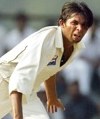 Historically, the ICC’s tendency to wishy-washiness would rival that of most kitchen detergents. Throughout the whole Pakistan corruption saga, then, we’ve waited anxiously to see whether decisive action would be taken.
Historically, the ICC’s tendency to wishy-washiness would rival that of most kitchen detergents. Throughout the whole Pakistan corruption saga, then, we’ve waited anxiously to see whether decisive action would be taken.
At last, after months of speculation and rehashing, the verdict is in. Yesterday, the ICC found Mohammad Asif and Mohammad Amir guilty of bowling deliberate no-balls for the gain of a betting syndicate, arranged by then-captain Salman Butt.
The debate will be now be whether those sanctions are too light, too harsh, or have a nature of which Goldilocks would approve.
Pre-verdict, talk of life bans had been flying as thick and fast as bats on a Sydney summer evening. The talk hasn’t led to anything more, but at first glance the punishments still looked comparatively stern.
There are bans of ten years for Butt, seven for Asif, and five for Amir, covering playing, coaching, and training with any organised cricket team at any level.
Those of Butt and Asif, it seemed, would certainly end their playing careers, as they would be 36 and 35 respectively once the bans expired. Amir would have the better chance: he will only be 23 when his ban expires, and most fast bowlers are still developing their game at this stage.
On closer inspection though, it transpires that five years of Butt’s sentence is suspended, as is two years of Asif’s. Effectively this leaves all three players with a five-year ban.
Asif will be 33 in five years, and while it would be hard to maintain one’s skills and fitness over such a long break, it is not be inconceivable (especially in the Twenty20 franchise age) that a player of his ability might not come back at a reasonable level.
Butt will be 31, which according to the Australian selectors is the perfect age for a Test batsman to debut. Perhaps he can serve the four-year residential qualification period in the interim.
While it seems anti-intuitive that any national set-up would re-admit such players after such a long lay-off, it’s in fact far too likely for comfort. Conspiracy theorists who view these players’ accountability as some sort of Anglo-Indian plot are hardly thin on the ground.
In some quarters the guilty three are already acquiring martyr status. Should Pakistan’s board in 2016 have anything like the ego problems of the Ijaz Butt regime, the suspended players may well be picked out of defiance and a misguided attempt to save face.
While a life ban may have been excessive given that the results of matches were not affected, it is blatantly wrong that Butt and Asif should be eligible for international selection again so soon.
A case can be made for Amir based on his youth and inexperience, and he has expressed his desire and intent to return.
Butt, though, was captain of the team and orchestrated the entire shady deal. It is his integrity that has been most utterly destroyed, and it was his place more than anyone to stand firm in the beginning. His punishment should be the fiercest of the lot.
Asif did not have the same power, but was the senior and experienced bowler. Both he and Butt were involved in recruiting Amir, whether by fear or favour. That both will have effectively the same suspension as the younger man is not a just result.
If the sentences were not partially suspended, they would be sound. Both would effectively take the guilty party past playing age. Amir, in turn, should have got ten years with five years suspended. That would have displayed clemency while keeping him on a good behaviour bond for a long time to come.
The crucial point is that the players have throughout this process maintained their innocence, but in the end they have been found guilty. The obvious implication is not only that they’ve lied, but lied repeatedly and calculatedly in the face of even the clearest evidence, in the hope of engineering some escape.
Their statements yesterday only reinforced that image, with any talk of appeals focusing on obtaining lighter sentences, not a different verdict.
“I don’t agree with a ten-year ban and once the rules in the code of conduct are amended, which the head of the tribunal has also requested to be done, I hope the punishment can be reduced,” said Butt.
These aren’t the words of a wrongly convicted man. Given his pre-verdict denials, it seems that Butt has merely been playing the percentages. There is not and has not been any sign of contrition.
Having now accepted that he’s been pinged, he is merely shifting his intent to finding the most favourable outcome. The ICC should do everything it can to prevent any such amelioration.
At least some sort of line has been ruled under the whole mess. The saddest part is the loss of a new-ball duo who had in the months prior to the scandal risen to be considered the best in the world.
In this pair, Pakistan had the ammunition to dominate Test matches and usher in a new era of success. But their tendency to overstep the paint by half a yard gave a new meaning to the term ‘frontline bowlers’.
Butt, meanwhile, also looked like a bright and hopeful candidate, as a young captain leading his team to victory over Australia in his first match in charge. Again, not to be.
The ICC’s punitive measures must have as their aim the avoidance of any repeat of such sadness. The loss of a playing career, rather than a portion of one, would be a far stronger disincentive. In this case, we can only wait and see whether the sentences are a little lacking in heat.





























































































